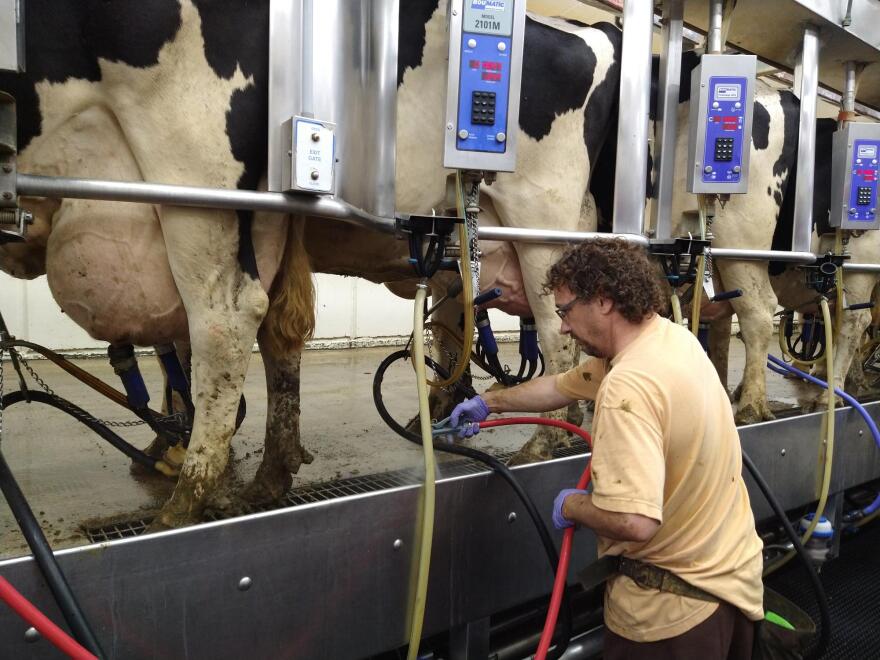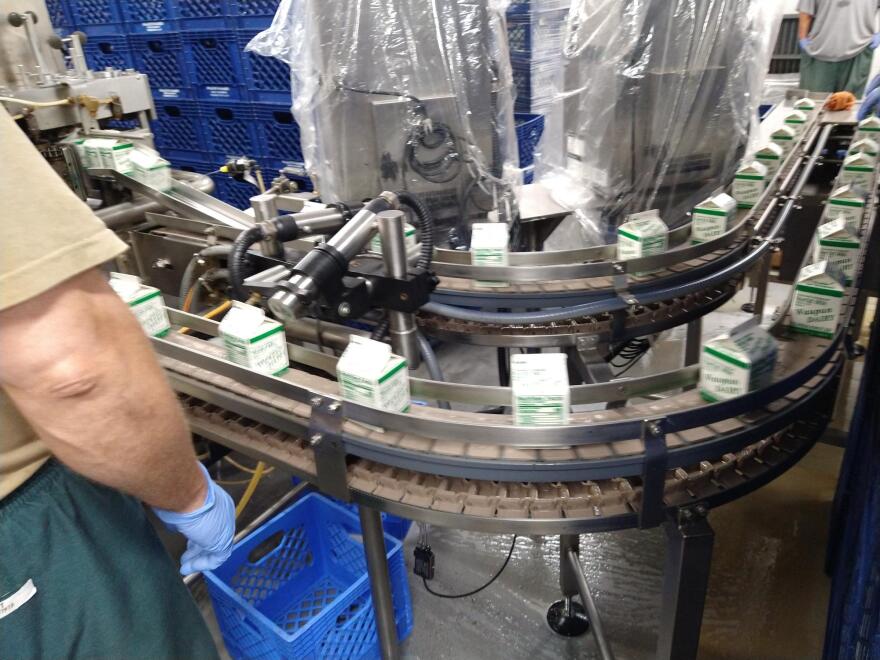There's a lot of heated talk during this election season about crime and who should be in prison.
But one reality is that 95% of Wisconsin's roughly 20,000 state prison inmates will complete their sentence and return to the community. So, the Department of Corrections continues to have some prisoners take part in work programs to boost their later chances of getting a job.
For nearly 140 years, the state has operated the Waupun Farm just east of the city. A few dozen men in custody with a high school degree or equivalent, a clean discipline record, and who want to be there presently work at the farm. Corn and other crops are grown on some of the 1,650 acres, and a lot of milk comes from the farm's 360 cows.

In the milking parlor on a recent morning, an inmate from Washington County, who the state only identified as Craig, attached a milking machine to the udder of one of the Holsteins.
He also spoke with a few reporters who were on a media tour arranged by the Corrections Department and the Wisconsin Department of Agriculture Trade and Consumer Protection.
Craig is about four years into his six-year prison sentence. During his four months at the farm, Craig said he's learned a lot about cows but also something about himself.
"When you've been in prison for a little bit, and also worked out here, you realize what you're missing. You get a little bit of freedom out here. Not really freedom, but you're out here in the wide open and that makes you feel better about yourself," Craig said.
Craig said he's also learned how to better get along with other people. He said he'd rather return to a construction job when he gets out of prison, but doesn't rule out working on a farm.

The state last year completed a six-million dollar update of the Waupun farm, including a new barn for the cows.
Reporters soon watched as an inmate identified as Anthony drove a tractor through the barn, pulling a large wagon called a TMR (Total Mixed Ration) that distributes feed for the cows.
Anthony said when he's released from prison he'd prefer to go back to his earlier work as a carpenter. But he said he's also gained from being at the farm.
"Working long hours. That helps a lot. Gets my body in shape for the work society. Also, patience in dealing with different people from different backgrounds. And operating different machinery, tractors. I've learned a lot here," Anthony said.
The raw milk produced at the farm is trucked to a small dairy processing building in between two of the three prisons in the city of Waupun.

At one machine, thick paper is turned into small containers for milk, ice cream and sherbet. Other machines dispense the product into those containers. The food goes, under contract, to state-run health facilities in Wisconsin, and state corrections facilities in Wisconsin and Minnesota. The Wisconsin Bureau of Correctional Enterprises, which operates the farm and dairy, is not allowed to compete with private businesses to sell the dairy products to the general public.
A man identified as Bernie is one of 26 men in custody who work at the dairy plant. Currently, he washes milk crates. He said the job is a good reminder for him.
"It's discipline, getting up in the morning, showing up for work, being part of the team, being on time for each assignment you've got while you're here," Bernie said. He added that once he's released in about 18 months, he'd consider working at a dairy plant if the job is closer to the quality control tasks he most recently had in the private sector.
The ability to screen who works at the dairy plant and farm may contribute to the two sites' relative success at reducing the percentage of men who wind up back in prison. State data show that 75% of Correctional Enterprises workers have not returned to state custody three years after release. That's about 15% better than the three-year rate for the overall Wisconsin prison population.

In an election year where conservative candidates are criticizing crime rates in the state, Corrections Secretary Kevin Carr said prison work programs are a crime fighter.
"Governor [Tony] Evers and I have long believed that public safety is one of our number one priorities. And there's a number of ways to achieve public safety. We believe that providing persons in our care with the skills, training, and treatment that they need to not re-offend is probably one of the best ways to accomplish public safety," Carr told WUWM.
He added that the current cost of incarcerating a prisoner in a state facility is close to $40,000 per year.
Suppose the Republican candidate for Governor, Tim Michels, should defeat incumbent Democrat Tony Evers in November. In that case, it'd be pretty easy for Michels to take his own look at the Waupun prison farm and dairy. The sites are less than 10 miles from his Michels Corporation headquarters in Brownsville.






